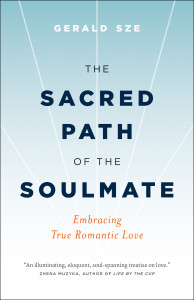
At any moment, millions of women and men are ending romantic relationships. This made Gerald Sze wonder: “Where did the passion go?”
Gerald understands passion. An award-winning spirituality author and existential philosopher, Gerald has studied and conducted research in the fields of spirituality and existential philosophy for nearly 30 years. Not only has he written the book on love—The Sacred Path of the Soulmate—his own passion was the driving force behind its publication.
The Sacred Path of the Soulmate comes from Gerald’s studies on the nature of romantic love and relationships, and the spiritual purpose of suffering. In the book, Gerald aims to help us understand the spiritual purpose of true romantic love so we can we follow the sacred path of the soulmate toward enlightenment.
We sat down with Gerald to discuss the book, and his publishing experience.
In your book, you say that we think about the concept of a soulmate the wrong way. What, in your words, is the definition of a soulmate, and how does that differ from the common definition?
The way I conceptualize “soulmate” is as a person who comes into your life to help you discover the meaning of life and of love. And because of a special connection with that person, because of the conflict you have, that forces you to look inwardly and find out more about what you need to change.
In Western culture, we think soulmates are only for one side of life: the happy side. But soulmates are always dualistic. Soulmates can bring out the best part of you, and they can also bring out the worst part of you, but either way they inspire you to be a better person.
So what is the “sacred path” of the soulmate?
To discover love within you, and within the way you connect with other people. It’s a relational path—in this moment, with you and with other people.
You talk about the willingness to suffer together as a key component in the soulmate journey. Why should I want to suffer with my soulmate? Shouldn’t we just be happy together?
Love is a continuous journey. It’s not a point where, oh, “you fall in love, you’re happy forever.” Let’s say I meet my soulmate and we’re happily married. Then I’m in my 30s or 40s, when suddenly my partner contracts a strange disease. If it’s true romantic love, I will not walk out on her. I will stick with her.
People are afraid to get into relationships because of the fear of losing someone. But that’s life! We are in the university of life to learn these lessons. If we don’t, we are going to suffer regardless. I know someone who lost her father when she was 13 and lost her husband when she was 29. And because of this, she is afraid to fall in love. But again, that’s life! When we greet a new person with “Hello,” that’s always followed by “Goodbye,” whether we like it or not.
What about people who don’t believe in reincarnation or spirituality? Do they still have soulmates and grow spiritually?
Yes. If we don’t know why the apple falls from the tree, it still falls. Likewise, if we don’t believe in the concepts of soulmates or reincarnation, fine. Life already has a built-in mechanism to help us grow: relationships. You don’t have to be a Buddhist to believe this, but as long as you want to live your life, you’re already on the journey.
Why does this subject matter to you so much? Who cares if other people find true romantic love?
I see so much suffering in other people, and in me. The only way to remove my pain is to transform it into a positive energy. That positive energy… I think of it as a passion, and I want to use my passion to help people be more aware, to make the world better for everyone.
Did being so close to this subject give you any challenges when writing the book?
The ideas in the book went through a lot of—how do I put it—proving that I’m wrong, not proving that I’m right. So I definitely came up against challenges. That is how I grow. I welcome challenges to strengthen my ideas, but I am confident these ideas in this book are on the right track.
Why did you choose LifeTree Media as your publisher?
I chose LifeTree because of the publisher, Maggie Langrick. She wants her authors to be successful. She’s not just here to make money—I can see her passion, too. That’s why I really wanted to work with her.
What was your favourite part about working with LifeTree?
The people. Publisher Maggie Langrick, publishing coordinator Paris Spence-Lang, every editor. Maggie breathed life into the book, turned my ideas into reality, and even gave the book its name!
The most beautiful connection is the human connection. Learning from everyone helped me learn about myself. I definitely would recommend LifeTree to other people.
The Sacred Path of the Soulmate is in stores May 6th in Canada and May 13th in the US.
- Lindsay Sealey’s Growing Strong Girls Gives Hope to Parents Under Pressure - September 7, 2017
- What I Learned About Confidence from Writing Growing Strong Girls: A Guest Post from Lindsay Sealey - September 7, 2017
- LifeTree’s Summer Reads - August 17, 2017

Paris your article wants me to read this book. I hope it is in our library.
If it doesn’t make its way into your local library, you can always pick up a copy for yourself at Amazon!